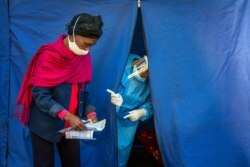The World Health Organization reports the COVID-19 pandemic is accelerating in Africa and moving from the continent’s large capital cities into the remote rural areas where it will be more difficult to contain the spread of the disease. Globally, there were more than seven million coronavirus infections Wednesday, including more than 400,000 deaths.
Latest reports Wednesday put the number of confirmed cases of coronavirus in Africa at more than 200,000, including 5,000 deaths. World Health Organization Regional Director for Africa, Matshidiso Moeti, notes it took 98 days to reach the first 100,000 cases and only 19 days to move to 200,000 cases.
“So, even though these cases in Africa account for less than three percent of the global total, it is clear that the pandemic is accelerating,” Moeti said. "Ten of the 54 countries in Africa are currently driving the numbers, and they account for 75 percent of the total cases. Five countries account for 71 percent of the total deaths.”
South Africa has the largest number of cases and deaths. Data show the majority of coronavirus deaths in the region follow a similar trend to that seen in Europe and the United States. That is, most who die are over age 60 and have underlying conditions such as diabetes, hypertension and obesity.
The pandemic arrived in Africa in February, later than in other parts of the world. Moeti says this gave countries precious time to prepare for the onset of the crisis. She says the experience gained from combatting deadly diseases such as Ebola and HIV/AIDS has enabled countries to quickly scale up their health operations.
She says lockdowns and other social measures such as social distancing, were quickly put in place. She says these public health measures have been effective in slowing the spread of COVID-19 in Africa.
“However, stay-at-home orders and closing of markets and businesses, have taken a heavy economic toll, particularly on the most vulnerable and marginalized communities, and we know that many African people work in the informal sector of the economy…So, the need to balance between saving lives and protecting livelihoods is a key consideration in this response, and particularly so in Africa,” Moeti said.
Africa faces many challenges. Moeti says one of the biggest is the lack of test kits and other supplies. She notes many essential health services are being neglected because of the focus on the pandemic. For example, she says vaccine preventable disease campaigns and regular immunizations against killer diseases have been reduced.
She expects Africans will have to live with a steady increase of COVID-19 until there is access to an effective vaccine. However, she says the disease probably could be managed so health systems are not overrun by people who are ill, if Africa gets the supplies and other international support it needs.





